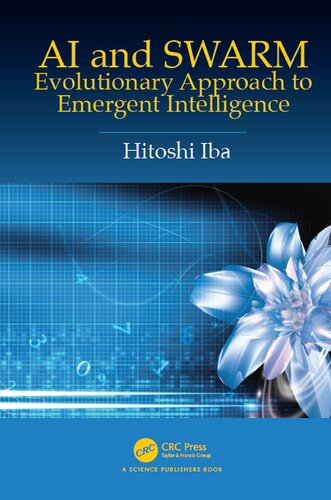

Most ebook files are in PDF format, so you can easily read them using various software such as Foxit Reader or directly on the Google Chrome browser.
Some ebook files are released by publishers in other formats such as .awz, .mobi, .epub, .fb2, etc. You may need to install specific software to read these formats on mobile/PC, such as Calibre.
Please read the tutorial at this link: https://ebookbell.com/faq
We offer FREE conversion to the popular formats you request; however, this may take some time. Therefore, right after payment, please email us, and we will try to provide the service as quickly as possible.
For some exceptional file formats or broken links (if any), please refrain from opening any disputes. Instead, email us first, and we will try to assist within a maximum of 6 hours.
EbookBell Team

5.0
58 reviewsThis book provides theoretical and practical knowledge on AI and swarm intelligence. It provides a methodology for EA (evolutionary algorithm)-based approach for complex adaptive systems with the integration of several meta-heuristics, e.g., ACO (Ant Colony Optimization), ABC (Artificial Bee Colony), and PSO (Particle Swarm Optimization), etc. These developments contribute towards better problem-solving methodologies in AI. The book also covers emerging uses of swarm intelligence in applications such as complex adaptive systems, reaction-diffusion computing, and diffusion-limited aggregation, etc.
Another emphasis is its real-world applications. We give empirical examples from real-world problems and show that the proposed approaches are successful when addressing tasks from such areas as swarm robotics, silicon traffics, image understanding, Vornoi diagrams, queuing theory, and slime intelligence, etc.
Each chapter begins with the background of the problem followed by the current state-of-the-art techniques of the field, and ends with a detailed discussion. In addition, the simulators, based on optimizers such as PSO and ABC complex adaptive system simulation, are described in detail. These simulators, as well as some source codes, are available online on the author’s website for the benefit of readers interested in getting some hands-on experience of the subject.
The concepts presented in this book aim to promote and facilitate the effective research in swarm intelligence approaches in both theory and practice. This book would also be of value to other readers because it covers interdisciplinary research topics that encompass problem-solving tasks in AI, complex adaptive systems, and meta-heuristics.